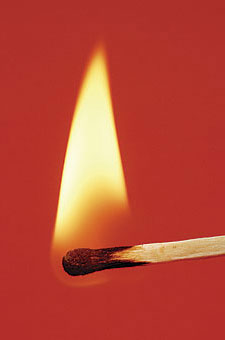No amount of theorizing will help us to appreciate how destructive and debilitating the care of others can be.
See the pastor once vibrant with power and enthusiasm, able to motivate others to service and godly living, given to caring and concern, become reduced to useless ineffective rubble emotionally exhausted and deeply fearful " and you’ll understand the ravages of emotional burnout.
See the spouse of the pastor, once the perfect hostess able to calm troubled waters and apply the soothing balm of comforting words and listening ears, become jittery when the telephone rings, panicked by any hint that the doorbell clanging and desperately wanting to be left alone " and you’ll recognize the exhausting tentacles of the burnout monster.
Or see the pastor who once patiently and kindly plodded his way through the prejudice and projections of ignorant and insensitive parishioners become a lonely, isolated, deeply depressed recluse who cannot get out of bed in the morning and who conceals her secret siestas like a closet alcoholic " and you’ll glimpse the reality of burnout.
I know because I’ve seen each one of them in the flesh. They are as real as the air I breathe.
A pattern of emotional overload with little reward or appreciation in the context of feelings of helplessness is at the heart of the burnout syndrome.
 Why are pastors particularly prone to burnout? Because:
Why are pastors particularly prone to burnout? Because:
(1) They have not been taught to care for others in the right way.
(2) They care too much out of guilt.
(3) They care too much and feel helpless about providing solutions.
(4) They care too much all of the time.
(5) They do not care enough about their own self-recovery.
Pastors tend to get overly involved emotionally. They tend to overextend themselves and then feel overwhelmed by the emotional demands imposed by others. And the more people there are to “feel responsible for.” the greater the opportunity for burnout.
One pastor described it this way:
“There are just too many people to care for. It’s just too much. I’m spread too thin and there is not enough caring to go around. Every day I pray to God for an abundant supply of his love to give to others, but it’s as if the pipe isn’t large enough for it to flow through.”
Once burnout sets in, pastors don’t believe they are able to give of themselves to others. It's not that they don’t want to help; they can’t. The gas is gone. The barrel is empty. It has also been called “compassion fatigue”.
The muscle of their loving heart goes weak and limp. No longer is it able to pump life-giving care and love to the rest of the needy body. The rhythm of the love-beat becomes erratic and irregular. Short bursts of compassion maybe mustered in times of emergency but it may suddenly and surprisingly cease at the most inopportune times. The love machine is powerless and eerily silent waiting for a miracle to bring it to life again. For many the miracle never happens. It is then called “burnout”.
But is all this talk about burnout for real? Could it be that our gullible Western minds have such a propensity for the faddish that we may be in danger of creating a monster simply by giving it a name? Will we not rush to excuse every moment of laziness or touch of incompetence simply as a symptom of burnout? Will it not take away responsible behavior? Will the cry “burnout’ not become a smoke screen for “cop-out”?
One pastor, in writing on the topic of burnout, claims he is becoming “bombed out” by all the talk of “burnout” and suggests that the present preoccupation with burnout creates the danger of being “sold out”. He believes it becomes an excuse for going contrary to the very things the Gospel stands for. Burnout becomes an excuse to leave the ministry, abandon a marriage, or give up on any activity that demands persistent, unrelenting dedication.
I agree! Discipleship was never, is never, nor ever will be easy. The servants of God must not be deterred by fake disasters, invented obstacles, or exaggerated weaknesses. But burnout is none of these for the majority of pastors. It is real hazard, produced in well-meaning and dedicated to people-caring, whose motives are pure and Holy Spirit-dependence sound. They simply discover that the human frame has its limits. like every machine. When these limits are exceeded, the price is “burnout”.
The warning not to allow the idea of “burnout” to be an excuse for I ‘cop-out’ is well heeded. But, on the other hand, prevention is better than cure. A thorough understanding of the phenomenon of burnout can help to pinpoint the pitfalls of this devastating and debilitating problem.
My concern here is not so much that a discussion of the inevitable potential for burnout among pastors will provide a convenient cover-up for incompetence, but so that a few readers will readily acknowledge the reality of the syndrome and that they are victims of it. It is a lot easier to understand that machines reach a stage of lifelessness and uselessness by being overworked than it is to convince so many well-meaning and dedicated ministers and people-helpers that this could happen to them.
There is something strangely paradoxical about believing you are a "servant of God" and acknowledging that you are on the road to burnout! Too many see it as a sign of failure rather than as a warning signal from an over-extended physique or psyche.




















